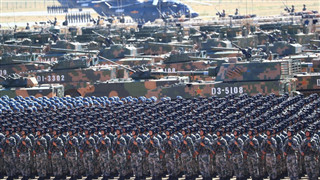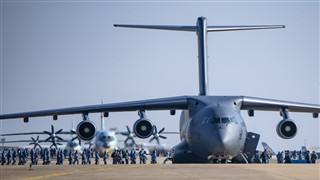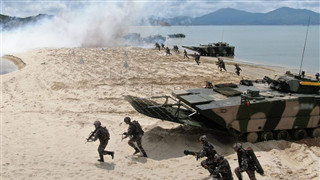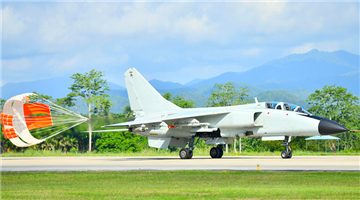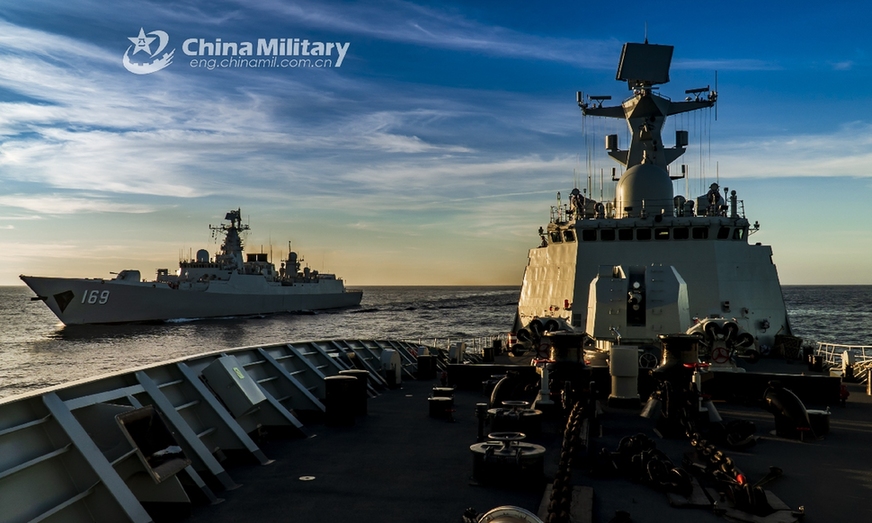
By Zhu Feng
The rapid deterioration of the China-US relations since the COVID-19 outbreak has put the Chinese and American people as well as the international community on pins and needles. The US side has stirred up a confrontation on multiple fronts and its right-wing anti-China forces are poised to launch a new Cold War. Under such circumstances, the two countries have to quickly actuate the last safety valve in their relation - to prevent any armed clashes amid the US' various military operations around China aimed at antagonism and intimidation, and to prevent military conflicts of various forms as the bilateral relationship is going through a period of profound challenges and uncertainties.
To actuate the last safety valve in China-US relations
After the COVID-19 pandemic broke out, America’s outrageous suppression of China has not only seriously disrupted the global anti-epidemic cooperation but also exposed the world’s aspiration and pursuit for peace, stability, and prosperity to a gloomy prospect never seen before in the past nearly 30 years after the end of the Cold War. The last ray of hope for preventing a final, complete China-US falling-out largely depends on the possibility of restarting dialogues between Chinese and American militaries as soon as possible.
The grim situation of the world-ravaging COVID-19 pandemic should have been a catalyst for closer China-US cooperation. Unfortunately, the political and policy elites in the US have taken the pandemic as a geo-strategic game that may tilt the China-US power structure in China’s favor.
There are three reasons why the Trump administration has been going all out to suppress China during the pandemic.
First, Trump himself and the right-wing anti-China forces have cracked their brains to scapegoat Beijing out of political and election considerations at home. They have spared no effort in concocting the “China threat theory” to create an external crisis that can help bridge their domestic political divide and divert the public attention from Trump’s anti-epidemic fiasco.
Second, policy elites at the White House and US Congress and strategic circle all want to leverage on the pressure stemming from the pandemic to push forward all sorts of anti-China measures, in the attempt to impose the “new Cold War” upon Beijing.
Third, in view of the upcoming election on November 3, the Trump administration plans to make its hardline stance and suppression against China a highlight in its diplomatic policies and make “suppressing China” the catchphrase to stoke public opinions, thus increasing Trump’s chances of winning by taking advantage of the rising anti-China sentiments across the American society after the pandemic. As the election date is drawing near, we need to stay on high alert and take preventive steps in preparations for whatever new moves Washington may make to escalate the China-US confrontation.
Keeping China-US conflicts from going out of control on the military front
The situation in the South China Sea and the Taiwan Strait is in great tension at present, as the US has sent its military vessels and aircraft to waters around China for more than 2,000 times this year. Avoiding armed conflict caused by accidental vessel or aircraft collision between the two countries should now be the line of reasoning of the US. It is also a responsibility the two powers must take for the aspiration of their peoples and the international community for peace and development.
The root cause of the tension in the South China Sea and the Taiwan Strait is the current US administration’s peremptory all-round suppression of China. While recognizing Trump administration’s motive for its “pandemic-related retaliation” against China - the huge domestic political interests - and its attempt of anti-China “new Cold War”, we should take actions to firmly safeguard our national interests and dignity instead of dancing to the American side’s tune of an eager attempt at confrontation.
Judging by experience from the Cold War rivalry between the United States and the Soviet Union, the more intense the major-country competition and confrontation, the more cautious the relevant powers should be in their military actions. The last “safety valve” to keep a major-country confrontation from getting out of control is that relevant parties should exercise necessary restraint and caution when their military forces are in maritime and air encounters or standoff. Fatal misjudgment of each other’s military and strategic intentions and radical operations should be avoided as much as possible.
As the Trump administration is desperate to pin the blame on China for its disastrous COVID-19 response and to gain more cards for the upcoming election, it is high time that the “safety valve” be re-actuated to manage and control the crisis in bilateral relation. Senior officers of the two militaries should restart contact and dialogue as soon as possible to reduce misjudgment between the two countries and militaries and avoid accidental friction and collision that may cause armed conflicts.
America’s top defense officials have also realized the immense potential risks behind the strategic game between Beijing and Washington. In an open speech on July 21, the US Defense Secretary Mark Esper continued to label China as a threat to the US and the free world and said in a provocation that the US military will continue to deter against China’s “coercive behavior” in the South China Sea. However, he also admitted that he didn’t want to see military conflicts between the two sides, instead, he hoped to visit China within the year to recover contact and dialogue between the two defense authorities. His remarks revealed some kind of reason and calm amidst the Trump administration’s hardball approach toward China.
Pushing China-US mil-to-mil relations forward at the moment of crisis
As China-US relations have come to the current state, top priority has to be given to adopt timely and effective crisis-control measures on the most pressing conflicting topics, prevent the collapse of the hard-won, mutually beneficial co-existence between the two countries that has lasted half a century, and avoid armed conflicts arising from the excessive hype of confrontational subjects. America’s unjustified suppression of China will only make the Chinese nation more united in firmly safeguarding our sovereignty, security, and development interests. In the meantime, the restart of contact, dialogue, and consultation between relevant departments to substantially carry out crisis control is also where our national interests lie at such a critical juncture.
The author is the executive director of the Collaborative Innovation Center of South China Sea Studies and dean of the School of International Relations, Nanjing University. This article is originally published on huanqiu.com and translated from Chinese into English and edited by the China Military Online. The information, ideas or opinions appearing in this article do not necessarily reflect the views of eng.chinamil.com.cn.

